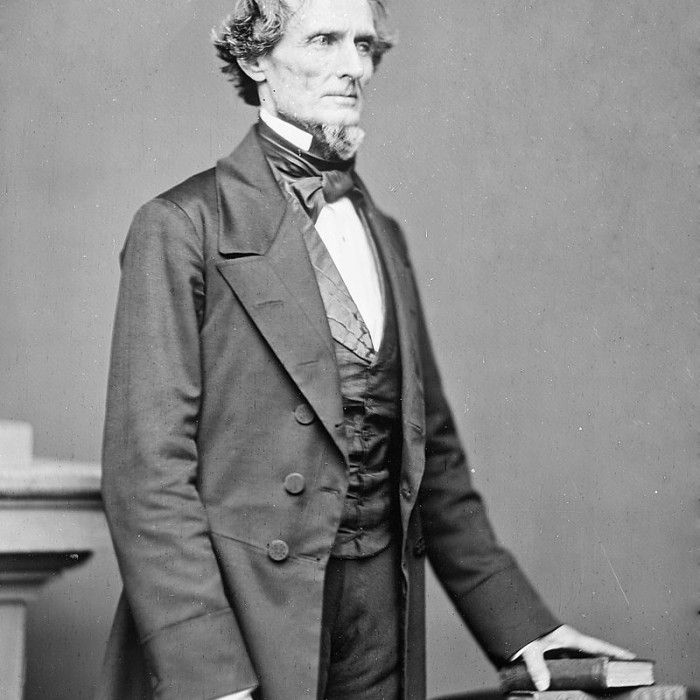
Jefferson Finis Davis (June 3, 1808 – December 6, 1889) was an American politician who was a Democratic U.S. Representative and Senator from Mississippi, the 23rd U.S. Secretary of War, and the President of the Confederate States of America during the American Civil War.
He took personal charge of the Confederate war plans but was unable to find a strategy to defeat the more populous and industrialized Union. His diplomatic efforts failed to gain recognition from any foreign country, and at home, the collapsing Confederate economy forced his government to print more and more paper money to cover the war's expenses, leading to runaway inflation and devaluation of the Confederate dollar.
Davis was born in Kentucky to a moderately prosperous farmer, and grew up on his older brother Joseph's large cotton plantations in Mississippi and Louisiana. Joseph Davis also secured his appointment to the U.S. Military Academy at West Point.
After graduating, Jefferson Davis served six years as a lieutenant in the U.S. Army. He fought in the Mexican–American War (1846–1848), as the colonel of a volunteer regiment. He served as the U.S. Secretary of War from 1853 to 1857 under President Franklin Pierce, and as a Democratic U.S. senator from Mississippi.
Before the war, he operated a large cotton plantation in Mississippi but never owned more than 74 slaves. After the war had ended, he remained a proud apologist for the cause of slavery for which he and the Confederacy had fought.
Although Davis argued against secession in 1858, he believed that each state was sovereign and had an unquestionable right to secede from the Union.
Davis's first wife, Sarah Knox Taylor, died of malaria after three months of marriage, and he also struggled with recurring bouts of the disease. He was unhealthy for much of his life. At the age of 36, Davis married again, to 18-year-old Varina Howell, a native of Natchez who had been educated in Philadelphia and had some family ties in the North. They had six children. Only two survived him, and only one married and had children.
Many historians attribute the Confederacy's weaknesses to the poor leadership of President Davis. His preoccupation with detail, reluctance to delegate responsibility, lack of popular appeal, feuds with powerful state governors and generals, favoritism toward old friends, inability to get along with people who disagreed with him, neglect of civil matters in favor of military ones, and resistance to public opinion all worked against him. Historians agree he was a much less effective war leader than his Union counterpart Abraham Lincoln.
After Davis was captured in 1865, he was accused of treason and imprisoned at Fort Monroe. He was never tried and was released after two years. While not disgraced, Davis had been displaced in ex-Confederate affection after the war by his leading general, Robert E. Lee.
Davis wrote a memoir entitled The Rise and Fall of the Confederate Government, which he completed in 1881. By the late 1880s, he began to encourage reconciliation, telling Southerners to be loyal to the Union. Ex-Confederates came to appreciate his role in the war, seeing him as a Southern patriot, and he became a hero of the Lost Cause in the post-Reconstruction South.
Source: Link

1564 - 1616

1803 – 1882

1854 – 1900

1942 – 2016

1928 – 2014

1835 – 1910

1869 – 1948

1884 – 1962
1898 – 1963

1929 – 1993

1879 – 1955

1809 – 1865

1807 – 1870

1800 – 1859

1795 – 1821

1755 – 1793

1984 -

1989 – 2011

1943 – 2001

1815 – 1902

1929 – 1994

1767 – 1848
